WHO resumes negotiations over Pandemic Agreement
WHO Member States have agreed to resume negotiations to finalize a pandemic agreement from April 29 to May 10.
This decision follows two weeks of intensive discussions led by countries on vital topics aimed at enhancing global preparedness and response to future pandemics in an equitable manner.
The ninth meeting of the Intergovernmental Negotiating Body (INB9) began on March 18 and concluded today.
During this period, government negotiators deliberated on all articles of the draft agreement, covering areas such as sufficient financing for pandemic preparedness, equitable access to necessary medical countermeasures during pandemics, and strengthening the health workforce.
‘It’s Critically Important’ : WHO Director-General
“Our Member States recognize the critical importance of the pandemic agreement in safeguarding future generations from the hardships endured during the COVID-19 pandemic,” stated WHO Director-General Dr. Tedros Adhanom Ghebreyesus.
“I express my gratitude for their unwavering commitment to reaching consensus and finalizing this historic agreement in time for the World Health Assembly.”
The resumption of INB9 next month will serve as a crucial milestone preceding the 77th World Health Assembly, scheduled to commence on May 27, 2024.
During this assembly, Member States will deliberate on the proposed text of the world’s inaugural pandemic agreement for adoption.
Dr. Precious Matsoso, Co-Chair of the INB Bureau, emphasized the clear recognition among governments that the objective of a pandemic agreement is to prepare the world for preventing and responding to future pandemics based on consensus, solidarity, and equity.
She stressed that these goals must guide the finalization of this historic commitment for the world, as failure would mean failing humanity, including those affected by COVID-19 and those vulnerable to future pandemics.
Mr. Roland Driece, Fellow INB Bureau Co-Chair, echoed this sentiment, stating that governments have emphasized the importance of reaching an agreement at the upcoming World Health Assembly to create a healthier, fairer, and safer world from pandemics.
He underscored the commitment to maximizing the remaining negotiations to achieve the outcome needed by the entire world.
In December 2021, the World Health Assembly held a Special Session, only the second in WHO’s history since its founding in 1948, and decided to establish the INB to draft and negotiate a WHO convention, agreement, or other international instrument on pandemic prevention, preparedness, and response.
This process has involved participation from other United Nations bodies, non-state actors, relevant stakeholders, and the public.-for-a-who-instrument-on-pandemic-prevention--preparedness-and-response.tmb-1200v.jpg?sfvrsn=4995a707_1)
Negotiations are currently underway at the World Health Organization (WHO) for new rules regarding pandemic management, with a target date of May 2024 for the adoption of a legally binding agreement by the WHO’s 194 member countries.
This initiative aims to strengthen global defenses against new pathogens in the aftermath of the COVID-19 pandemic, which has resulted in the loss of nearly 7 million lives.
Addressing Systemic Deficiencies
The WHO Pandemic Agreement aims to address the systemic deficiencies exposed by the COVID-19 pandemic, aiming to bolster global defenses and prevent future pandemics from escalating into devastating human tragedies.
Positioned as the world’s inaugural pandemic treaty, its primary objective is to enhance pandemic prevention, preparedness, and response, with a focus on achieving equity as both a goal and an outcome.
The agreement confronts the stark inequalities laid bare during the COVID-19 crisis, including insufficient preparedness within countries and inadequate coordination at the international level.
Need for a Broader Agreement:
The World Health Organization (WHO) currently has binding regulations known as the International Health Regulations (IHR), established in 2005 to outline countries’ responsibilities in managing public health events with potential cross-border implications.
These regulations mandate immediate reporting of health emergencies to the WHO and outline measures related to trade and travel. While suitable for regional epidemics like Ebola, they are deemed insufficient for global pandemics, prompting a review post-COVID-19.
Member states have recognized the need for a new, broader pandemic agreement that would be legally binding for participating countries, overcoming initial hesitations, particularly from the United States.
This would mark only the second health treaty after the 2003 Framework Convention on Tobacco Control, which focuses on reducing smoking through taxation and regulations on labeling and advertising.
How do countries view the pact?
The European Union is regarded as the primary advocate for the proposed pandemic accord, while developing nations, particularly in Africa, view the negotiations as an opportunity to enhance access to vaccines.

This initiative follows accusations of “vaccine apartheid” by WHO Director-General Tedros.
Despite five rounds of formal negotiations, the latest 208-page draft of the treaty still contains numerous brackets, indicating areas of disagreement or undecided language, such as the definition of the term “pandemic.”
Given the involvement of numerous member countries, reaching a consensus may prove challenging.











